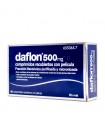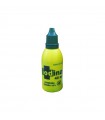Fortasec is an antidiarrheal that reduces bowel movements and secretions, resulting in a decrease in liquid bowel movements. Fortasec is used for the symptomatic treatment of non-specific acute diarrhea in adults and children 12 years and older.
You should see a doctor if it gets worse or if it does not improve after 2 days.
ACTION AND MECHANISM
- [ANTIDIARRHEIC], [OPIATE AGONIST (MU)]. Derived from pethidine. Opiate receptor μ, which inhibits the release of acetylcholine and prostaglandins into the myenteric plexus of Auerbach, reducing intestinal peristalcy. By decreasing intestinal transit, it promotes the absorption of water and electrolytes, decreasing the frequency and quantity of bowel movements, and increasing their viscosity. It also exerts a certain anti-secreting effect. It also increases the tone of the anal sphincter, decreasing incontinence.
SPECIAL WARNINGS
- The administration of loperamide to patients with diarrhoea does not exclude adequate hydration of the patient, so it is advised to administer liquids such as water, infusions or oral rehydration solutions in the necessary amounts. Symptoms such as thirst, mouth and dry skin or decreased urine volume are clear signs of dehydration.
- It is not advisable to administer loperamide to dehydrated patients before correcting dehydration
Elderly
Diarrhoea-associated dehydration is especially common in the elderly, so there can be great variability in its effects.
PATIENT ADVICE
- It is not advised to institute treatment with an antidiarrheal without consulting with a doctor, as the antidiarrheal may worsen symptomatology.
- A doctor should be used if acute diarrhoea persists or worsens after two days of treatment.
- Consult your doctor if your stool is black, oily-looking, fetid or manifests the presence of blood, mucus or pus. A doctor should also be used if a fever greater than 38 oC occurs in children or 38.5 oC in adults, or if the patient has abdominal pain that does not decrease with deposition.
Contraindications
- [OPIOID ALLERGY] or any component of the medicine.
- Bloody diarrhoea caused by invasive microorganisms such as enteroinvasive strains of Escherichia coli, Salmonella ([SALMONELOSIS]) or Shigella ([SHIGELOSIS]), or in the case of [PSEUDOMEMBRANOSA COLITIS], caused by broad-spectrum antibiotics. In these situations the use of loperamide is not advised, as inhibiting peristalcy may increase the contact time between the intestinal mucosa and microbial toxins, increasing damage. Antibiotics may sometimes be necessary in case of bacterial diarrhea.
· Situations in which the inhibition of peristalcy is to be avoided, such as [STRESS], [INTESTINAL OBSTRUCTION] or [ABDOMINAL DISTENSION], since loperamide could aggravate the process. If any of these symptoms occur during the treatment of diarrhoea, it is advised to stop treatment.
Pregnancy
Animal safety :in animal studies using doses 30 times higher than human ones did not show harm to the fetus. Higher doses alternated maternal and neonatal survival.
Human safety :adequate and well-controlled human studies are not available. Administration is only accepted if there are no safer therapeutic alternatives, and the benefits outweigh the potential risks.
Effects on fertility: using doses 150-200 times higher than human ones, it has been shown that loperamide could reduce the fertility of males and females.
Pharmacokinetics
Orally:
- Absorption: It is absorbed in the intestine, presenting a bioavailability of 40%. He suffers from first-step metabolism. Cmax is reached at 5 hours (capsules) or 2.5 hours (solutions). Its effects last up to 24 hours.
- Distribution: Circulates bound to plasma proteins (97%). It crosses the blood brain barrier with great difficulty.
- Metabolism: It is metabolized in the liver, resulting in inactive metabolites.
- Elimination: It is eliminated by metabolism, being the metabolites excreted with faeces (30% unchanged), and in very small amount with urine (<2%). Its elimination half-life is about 10 hours. The fraction of loperamide removed to the intestine can be reabsorbed, resulting in an enterohepathic cycle.
Pharmacokinetics in special situations:
- Hepatic impairment: The metabolism of loperamide may be decreased in case of hepatic impairment, resulting in a decrease in liver clearance.
Indications
- [DIARREA]. Symptomatic treatment of acute or chronic diarrhoeal processes.
Interactions
- Cholestyramine. A study has recorded a possible inhibition of the effect of loperamide, so spacing for administration is recommended.
- Laxatives: Administration of antidiarrheals such as loperamide with intestinal bolus-boosting laxatives such as ispagula, methylcellulose, agar or sterculia gum is not recommended, because simultaneous use can cause intestinal obstructions with severe results for patients.
- Ritonavir or quinidine (Glycoprotein P inhibitors): possible increase in loperamide Cp. Caution.
- CYP3A4 inhibitors (e.g. ketoconazole or itraconazole) and CYP2C8 (gemfibrozile): possible increase in loperamide Cp. Caution.
- Saquinavir: Possible reduction of saquinavir Cp with risk of decreased antiviral activity.
- Theophiline. A decrease in the absorption of theophiline has been observed in pharmacokinetic studies when administered in forms of controlled release, probably due to inhibition of intestinal motility.
- Opiate painkillers. Simultaneous use may increase the risk of severe constipation and CNS depression.
Breast feeding
It is not known whether loperamide is excreted in significant amounts with human milk, and whether this could affect the child. The American Academy of Pediatrics considers it compatible with breastfeeding, but extreme precautions are advised.
Children
Safety and efficacy in children under two years of age have not been evaluated and is therefore not recommended for use. In children over 2 years of age it is advised to exercise extreme precautions as there can be great variability in the pharmacological response, due to dehydration. Similarly, children under the age of 3 are more sensitive to the central opiate effects of loperamide.
RULES FOR PROPER ADMINISTRATION
It is advised to divide doses of loperamide into two-three doses when administered for chronic diarrhea.
Dosage
- Adults, oral:
* Acute diarrhea: Initial 4 mg will be administered, followed by 2 mg after each deposition.
* Chronic diarrhea: 4 mg initials will be administered, and then 2-12 mg/24 hours until 1-2 bowel movements daily.
The maximum daily dose is 16 mg.
- Children, oral:
* Children over 5 years old:
a) Acute diarrhoea: Initial 2 mg shall be administered, followed by 2 mg after each deposition.
b) Chronic diarrhea: 2 mg initials will be administered, and then the dose needed to get 1-2 daily bowel movements.
* Children 2-5 years old: Initially 0.4 ml/kg/24 hours, up to a maximum of 1.2 ml/kg/24 hours. Treatment will be discontinued at the time the bowel movements are normal or there have not been in 12 hours.
* Children under 2 years of age: The safety and efficacy of loperamide in children under 2 years of age have not been evaluated.
The maximum daily dose is 6 mg/20 kg.
POSOLOGY IN HEPATIC IMPAIRMENT
No specific dosage recommendations are available. Caution is advised as your first-step metabolism may be decreased.
POSOLOGY IN RENAL INSUFFICIENCY
No dose adjustment is necessary.
Precautions
- [HEPATIC INSUFFICIENCY]. Loperamide is eliminated by liver, so in case of insufficiency it could dismunise the metabolism first step, with the consequent accumulation of the drug. It may be necessary to readjust the dosage according to the degree of insufficiency.
- [ULCERATIVE COLITIS] or [HIV INFECTION]. In patients with ulcerative colitis or AIDS, administration of antidiarrheals intestinal motility inhibitors has been associated with an increased incidence of toxic megacolon, so extreme precautions and discontinuation of treatment in the event of bloating or other symptoms such as severe abdominal pain, nausea, vomiting or loss of appetite.
- [DEHYDRATION]. Inhibition of intestinal peristalticism can lead to fluid retention in intestinal light, aggravating dehydration. It is advised to first correct patient dehydration by providing water or oral rehydration solutions.
EXCIPIENT PRECAUTIONS
- This medicine contains lactose. Patients with hereditary or gactose [LACTOSE INTOLERANCE], Lapp lactase insufficiency or glucose or galctose malaabsorption should not take this medicine.
ADVERSE REACTIONS
Side effects of loperamide are generally uncommon but moderately important. In most cases, adverse reactions are an extension of the pharmacological action and mainly affect the digestive system, being in most cases indistinguishable from the symptomatology of diarrhoea itself. These adverse reactions are more common in prolonged treatments. The most characteristic adverse reactions are:
- Digestives. In very rare (<0.01%) the appearance of [ABDOMINAL PAIN], [FLATULENCE], [DISPEPSIA], [NAUSEAS], [VOMITOS], [DENTATION], [DRY MOUTH], [ABDOMINAL DISTENSION], [PARALITIC ILEO] or [TOXIC MEGACOLON].
- Neurological/psychological. Rare (<0.01%) the presence of [SOMNOLENCIA] and [MAREO]. Children are especially sensitive to the nervous effects of loperamide.
- Genitourinarias. Occasionally [URINARY RETENTION] may appear.
- Allergic/dermatological. They are very rare (<0.01%) [EXANTEMATIC ERUPTIONS], [URTICARIA] or [PRURITO]. Isolated cases of [ANGIOEDEMA], [STEVENS-JOHNSON SYNDROME], [ERYTHEMA MULTIFORME] and [TOXIC EPIDERMIC NECROLISIS] have been reported, although their relationship with loperamide has not been evaluated.
Isolated cases of [HYPERSENSITIVITY REACTIONS] have also been reported, including [ANAFILAXIA].
Overdose
Symptoms: In case of overdose, central nervous system depression may occur, with stupor, drowsiness, myosis, muscle hypertonia and respiratory depression. Urinary retention or ileon atony may also occur. This overdose occurs mostly in case of hepatic impairment or in young children.
Treatment: The patient should be monitored for 48 hours for possible depressions of the central nervous system. If these symptoms occur, naloxone may be given as an antidote. As the duration of the effects of loperamide is longer than that of naloxone, which does not exceed three hours, administration of naloxone may have to be repeated. It may also be advisable to administer activated charcoal after intake of loperamide in case of accidental ingestion, followed by gastric lavage if vomiting has not occurred.




























